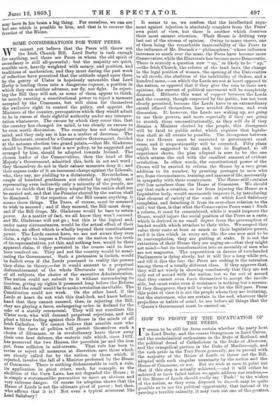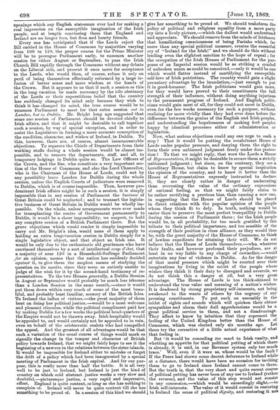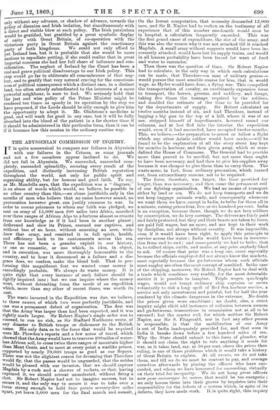HOW TO PROFIT BY THE INFATUATION OF THE PEERS.
IT seems to be still far from certain whether the party heat in Lord Derby, and the coarse Orangeman in Lord Cairns, and the ecclesiastical enthusiasm in the Duke of Rutland, and the political dread of Catholicism in the Duke of Abercorn, and the evangelical pietism in the Duke of Marlborough, and the rash pride in the Tory Peers generally, are to prevail with the majority of the House of Lords to throw out the Bill, adopted with such singular unanimity by the nation and the House of Commons, or not. But we wish at once to point out that if this step is actually achieved,—and it will either be achieved or have failed before we again address our readers,— if the House of Lords should really say Tush! ' to the wishes of the nation, as they seem disposed to do,—it may be quite possible so to use the political opportunity, that instead of its proving a terrible calamity, it may turn out one of the greatest
openings which any English statesman ever had for making a real impression on the susceptible imagination of the Irish people, and at length convincing them that England and Ireland are no longer foes, but firm and hearty friends.
Every one has anticipated that if the Lords reject the Bill carried in the House of Commons by majorities varying from 100 to 128, the proper course for the Prime Minister will be to prorogue Parliament early, to summon another session for either August or September, to pass the Irish Church Bill rapidly through the Commons without any debate on the Liberal side, and present it once more for acceptance to the Lords, who would then, of course, refuse it only on peril of being themselves effectually reformed by a large infusion of better sense and more wisdom at the hands of the Crown. But it appears to us that if such a session as this in the long vacation be made necessary by the idle obstinacy of the Lords or their superstitious belief that the country has suddenly changed its mind only because they wish to think it has changed its mind, the true course would be to summon Parliament to meet for that extra session not in London, but in Dublin. Mr. Bright long ago suggested that some one session of Parliament should be devoted chiefly to Irish affairs, and that it might be desirable to call together such a session, by way of special exception, and in order to assist the Legislature in forming a more accurate conception of the condition, character, and wishes of Ireland, in Dublin. To this, however, there are, of course, almost insurmountable objections. To separate the Chiefs of Departments from their working staffs during a whole session would be almost impossible, and to remove the departments, staff, and all, to temporary lodgings in Dublin quite so. The Law Officers of the Crown, and the Bar, who constitute a very important section of the House of Commons, and also the Lord Chancellor, who is the Chairman of the House of Lords, could not by any possibility leave London for Dublin during the whole session, unless the English Courts of judicature were removed to Dublin, which is of course impossible. Then, however predominant Irish affairs might be in such a session, it is simply impossible that in any session of Parliament the business of Great Britain could be neglected ; and to transact the legislative business of Great Britain in Dublin would be wholly impossible. On the whole, unless arrangements were ever made for transplanting the centre of Government permanently to Dublin, it would be a sheer impossibility, we suspect, to hold any complete session of a British Parliament there. But the grave objections which would render it simply impossible to carry out Mr. Bright's idea, would none of them apply to holding an extra long-vacation session in Dublin simply for a single legislative object, and that object an Irish one. It would be only due to the enthusiastic old gentlemen who have convinced themselves by a sort of intellectual coup d'e'tat, that a majority of near 120 in a Household-Suffrage Parliament for an opinion, means that the nation has suddenly decided against' it, to give them the amplest means of studying the question on its merits, since they seem so entirely unable to judge of the wish for it by the second-hand testimony of representatives. To the two Houses generally, a Dublin Session in August or September would probably be much less irksome than a London Session in the same month,--since it would put them down within easy reach of some of the most beautiful, and probably least familiar, scenery of the British Isles. To Ireland the influx of visitors,—the great majority of them bent on doing her political justice,—would be a most welcome and pleasant stimulus, while the political compliment paid her by making Dublin for a few weeks the political head-quarters of the Empire would not be thrown away. Irish hospitality would be appealed to, and would certainly not be appealed to in vain, even on behalf of the aristocratic zealots who had compelled the appeal. And the greatest of all advantages would be that such a variation of the usual course of things would mark so signally the change in the temper and character of British policy towards Ireland, that we might fairly hope to see it the beginning of a new era in the relations between the sister islands. It would be impossible for Ireland either to mistake or forget the drift of a policy which had been inaugurated by a special meeting of Parliament in the Irish capital. And for our purpose, this is really more than half the battle. It is all very well to be just to Ireland, but Ireland is just the kind of country on which cold abstract justice works a very slow and doubtful,—picturesque justice, a very rapid and impressive, effect. England is quite content, so long as she has nothing to complain of. Ireland will never be quite content till she has something to be proud of. In a session of thierkind we should give her something to be proud of. We should transform the policy of political and religions equality from a mere party cry into a lively picture,—which the dullest would understand and appreciate. We should remove from the minds of Irishmen that humiliating consciousness of being Pariahs which, far more than any special political measure, creates the resentful cry of "Ireland for the Irish!" and we should do this without lending even the slightest sanction to the hope of repeal ; for the occupation of the Irish Houses of Parliament for the purposes of an Imperial session would be as striking a symbol of unbroken union as could be conceived,—only it would be one which would flatter instead of mortifying the susceptible self-love of Irish patriotism. The country would gain a slight pecuniary advantage by the inundation,—just enough to put it in good-humour. The Irish politicians would gain more, for they would have proved to their constituents the full strength of their influence, without doing anything injurious to the permanent progress of Ireland. And English politicians would gain most of all, for they could not meet in Dublin, even for the few weeks necessary for such a purpose, without realizing far more vividly than they had ever done before thedifference between the genius of the English and Irish peoples, and understanding the hopelessness of making both peoples happy by identical processes either of administration or legislation.
Now, what serious objections could any one urge to such a step ? That it would be putting the recalcitrant House or Lords under popular pressure, and denying them the right toform their own unbiassed judgment freely under due protection ? To that we might reply, that were the Lords a Houseof Representatives, it might be desirable to secure them a strictly unbiassed judgment ; but since, on the contrary, they are a hereditary House, but claim to know by special inspiration the opinion of the country, and to know it better than theHouse of Representatives expressly instructed to declare it, they are clearly rather in danger of underrating than overrating the value of the ordinary expressionsof national feeling, so that we might fairly claim tobe rather rectifying a previous bias, than causing a new one,_ in suggesting that the . House of Lords should be placed in direct relations with the popular opinion of the people whom they think fit to defy. In truth, nothing would beeasier than to preserve the most perfect tranquillity in Dublin during the session of Parliament there ; for the Irish peoplewould be, in all probability, far too much gratified by this tribute to their political importance, and too sensible of the strength of their position in close alliance, as they would thus be, with the great majority of the House of Commons, to think of lawless expedients for attaining their will. We do not believe that the House of Lords themselves,—who, whatever their faults, and however profound their prejudices, are at least in no way liable to any charge of cowardice,—would entertain any fear of violence in Dublin. As for the danger of that moral pressure which might be exerted over their imaginations by living in the midst of the people whose wishes they think it their duty to disregard and overrule, we do not think this a danger at all, but a very great advantage. The House of Lords is too thick-skinned tounderstand the true value and meaning of a nation's wishes. It is deadened by strong proprietary self-interests, not being awakened to the wants of others by the urgency of any pressing constituents. To put such an assembly in the midst of sights and sounds which will quicken their obtuse sympathies and alarm their dull apprehensions would be a great political service to them, and not a disadvantage. They affect to know by intuition that they represent the feeling of the United Kingdom better than the House of Commons, which was elected only six months ago. Let• them try the corrective of a little actual experience of what that feeling is. But it would be conceding too much to Irish vanity, and whetting an appetite for that political petting of which thereis already, it is said, in our Revenue system only too much trace.' Well, even if it were so, whose would be the fault ;• ff the Peers had shown some decent deference to Ireland while at a distance, there would have been no occasion for inviting them to go to Ireland since Ireland cannot come to them. But the truth is, that the very short and quite recent course of political petting has never been of any use to Ireland (rather the reverse), and the value of this step would not consist in any concession,—which would be exceedingly slight,—to Irish self-interests. The value of it would consist in restoring to Ireland the sense of political dignity, and restoring it. not only without any advance, or shadow of advance, towards the policy of disunion and Irish isolation, but simultaneously with a direct and visible blow at such policy. The Irish patriotism would be gratified, but gratified by a great symbolic display of unity with Great Britain, of co-operation with the victorious party in Great Britain against the reactionary party of both kingdoms. We could not only afford to pet Ireland less, but it is probable that she would be more anxious to repudiate petting, if she could realize that in great imperial concerns she had her full share of influence and consideration. The neglect of Ireland by the Court has been a real and grave political disadvantage to our Irish policy. This step would go far to obliterate all remembrance of that neglect, and to gratify that very natural craving for the consciousness of political consequence which a distinct race, in a distinct land, too often utterly subordinated to the interests of a more powerful neighbour, is sure to feel. We seriously hold that the just and wise policy of the Prime Minister might be rendered ten times as speedy in its operation by the step we have proposed, if the Lords should be silly enough to give him the opportunity to adopt it. Mr. Gladstone's medicine is good, and will work for good in any case, but it will be fully absorbed into the blood of the patient in a far shorter time if it should be administered in this particular form, than it can be if it becomes law this session in the ordinary routine way.
































 Previous page
Previous page